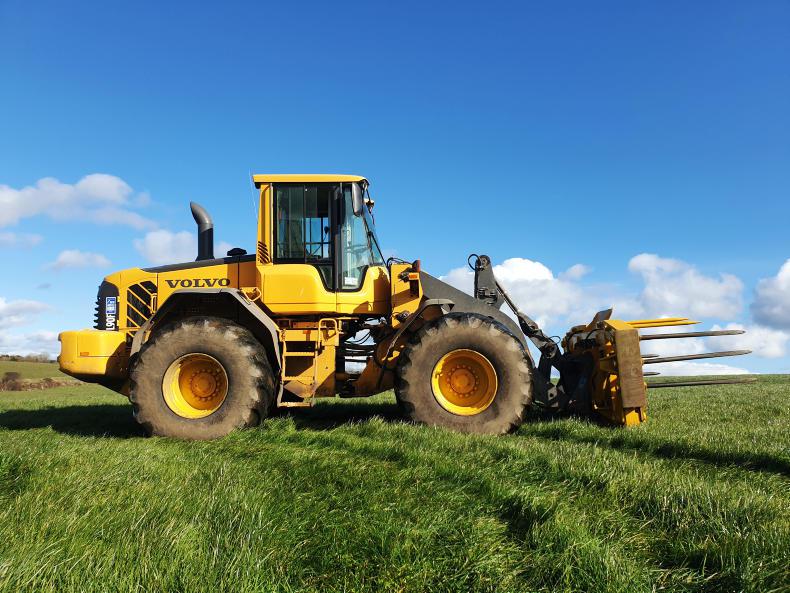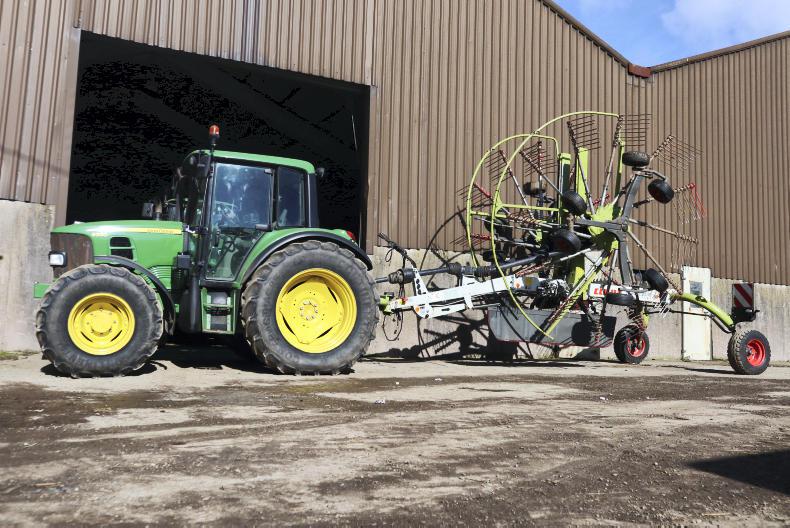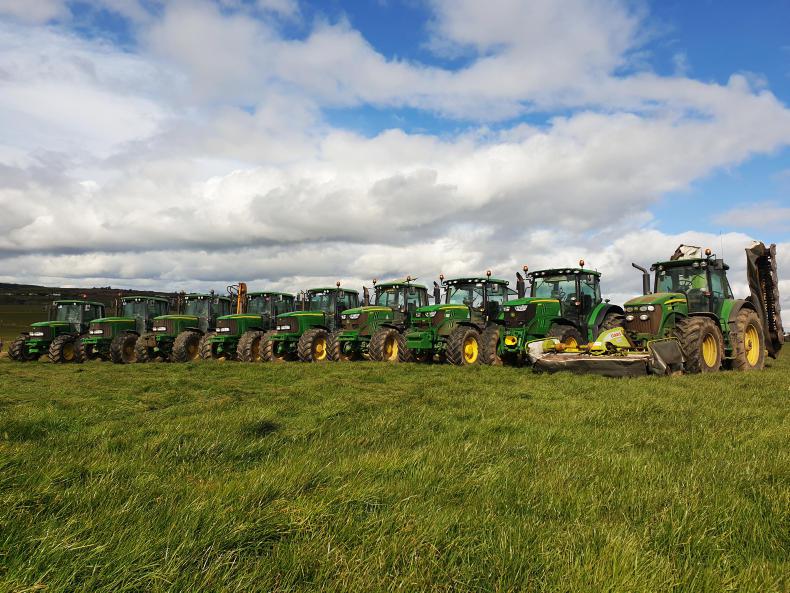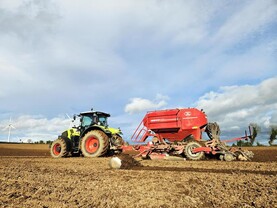In 1989, at the age of 21, Emmanuel Barry purchased his first machines to kickstart his agricultural contracting business. He bought a Zetor Crystal 8145 and a Landini 7550 to drive a Claas Rollant 44 round baler and a Kverneland wrapper, one of the first in the country at the time.
“Getting up and running with a contracting business was never easy, it was always tough going,” Emmanuel explained.
“The one thing that stood to me that time was the fact I had one of the first round balers in the area. In the early 1990s, there were three round balers in a 10-mile radius around here. Today, there must be over 50 balers in the area.”

“I never regretted becoming a contractor. I really enjoyed my time contracting, but at the same time I’m happy to be getting out", explained Emmanuel.
Why are you getting out of agricultural contracting?
“To be honest, I have just got enough of it. I’m at it 30 years and I have got enough of working long hours and dealing with the pressures, especially during the summer months.
“There’s too many contractors, not just around here but all over Ireland. That brings serious competition for work. There’s one or two guys coming into this area offering to cut silage up to €30 an acre cheaper. It just isn’t feasible.
“Machinery costs have risen significantly over the years and contracting rates haven’t moved accordingly. In the late 1990s, I was cutting silage with a trailed Mengele harvester and we were getting £60 an acre, which is the equivalent of €75 to €80 today. Nowadays, we are getting €110/115 an acre, but tedding and raking has become part of the job.
“Twenty years ago, new silage trailers could be bought for £3,000. Today, you’re talking €25,000 to €30,000. In two decades, the price of new tractors has also grew exponentially.”
What changes have you seen in contracting over the years?
“Farming has changed a lot over the years. One time, farmers would wait up to a week for the contractor. Today, that isn’t the story. Machinery has also got bigger and bigger. One time, silage cutting started in May and finished in September. It was a proper season. Today, 10 days and the majority of the silage is cut.

This 2009 Volvo L90F was owned by Emmanuel since new and has accumulated 5,844 hours.
“Nowadays, new machinery is getting more and more expensive each year. Tractors seem to go up by 2% to 3% every year. I was chatting to another contractor recently and what he said was very true – one time, you could buy a tractor with a chequebook. Whereas nowadays, you can hardly buy a set of tyres with the chequebook.
“It’s not just the price of machinery that has gone up year on year. I’ve noticed a significant rise in insurance over the past decade. In fact, I believe my insurance has risen by 20% to 30% in the past 10 years.”
What does the future hold for agricultural contractors in Ireland?
“As much or as little work as the contractors in Ireland are doing, the service they provide will always be required by farmers. I think the biggest problem is that many farmers don’t appreciate the top-class service they get.
“Realistically, the price of cutting silage really needs to go up. But farmers aren’t making money so how can we charge them more? I can see a lot more contractors getting out of the game in the near future. In fact, I know some guys that would get out in the morning if they could, only for they’re so tied with huge annual repayments and debt.
“Going forward, I think contractors will have to offer a full low-emission slurry spreading option to farmers. This is a huge extra cost on the contractor, a cost that if I’m honest, I don’t think contractors will be able to charge much more than if they spread it with a splash plate. I can also see availability of good drivers being an issue in the coming years.”

The auction consisting of Emmanuel’s entire fleet of tractors and equipment will take place tomorrow, Friday 13 March at 11:30am.
What advice would you give to someone thinking of setting up an agricultural contracting business?
“Contracting is a tough game. You really have to love it or you won’t stick at it for too long. If you do it right you’ll make a living out of it, but you won’t get rich from it.
“The next decade in Irish agriculture is really unknown. We are going down a very twisty road. There are going to be big changes with climate change, carbon tax, Brexit and cuts/changes to CAP. All this will have a knock-on effect on the contractor. But if you’re young and interested, I’d advise a young lad to give it a go.”
Did you ever regret getting into the contracting business?
“I never regretted becoming a contractor. I really enjoyed my time contracting, but at the same time I’m happy to be getting out. It’s like a weight off my shoulders. My wife Mary and myself can look forward to relaxing in the summers. Now I’ll be honest, this might change come May when I get the smell of the grass.”
The auction
The auction consisting of Emmanuel’s entire fleet of tractors and equipment will take place on Friday 13 March at 11.30am. The auction will be hosted by Michael Doyle and is set to take place indoors at Emmanuel’s yard (P17 WD27).
A total of over 100 lots will be up for grabs. These include 11 tractors, nine of which are John Deere (2016 6195R, 2016 6145R, 2016 6150M, 2008 6330, 2008 7830 and four 6920s ranging from 2004-2006) and two Deutz (2009 X720 and a 2014 6160).
Other grass-related equipment up for auction include a 2009 Volvo L90 wheel loader, two sets of Claas butterfly mower units, seven silage trailers (five Thorpe’s, one Redrock and one Smyth), two balers (McHale 5500 and Claas 354), rakes, tedders and two silage forks. Additional equipment includes two slurry tankers, an agitator, a Bredal K85, and a Gaspado four-row maize drill.
Check next week’s print edition of the Irish Farmers Journal and online for full coverage of the auction. 
In 1989, at the age of 21, Emmanuel Barry purchased his first machines to kickstart his agricultural contracting business. He bought a Zetor Crystal 8145 and a Landini 7550 to drive a Claas Rollant 44 round baler and a Kverneland wrapper, one of the first in the country at the time.
“Getting up and running with a contracting business was never easy, it was always tough going,” Emmanuel explained.
“The one thing that stood to me that time was the fact I had one of the first round balers in the area. In the early 1990s, there were three round balers in a 10-mile radius around here. Today, there must be over 50 balers in the area.”

“I never regretted becoming a contractor. I really enjoyed my time contracting, but at the same time I’m happy to be getting out", explained Emmanuel.
Why are you getting out of agricultural contracting?
“To be honest, I have just got enough of it. I’m at it 30 years and I have got enough of working long hours and dealing with the pressures, especially during the summer months.
“There’s too many contractors, not just around here but all over Ireland. That brings serious competition for work. There’s one or two guys coming into this area offering to cut silage up to €30 an acre cheaper. It just isn’t feasible.
“Machinery costs have risen significantly over the years and contracting rates haven’t moved accordingly. In the late 1990s, I was cutting silage with a trailed Mengele harvester and we were getting £60 an acre, which is the equivalent of €75 to €80 today. Nowadays, we are getting €110/115 an acre, but tedding and raking has become part of the job.
“Twenty years ago, new silage trailers could be bought for £3,000. Today, you’re talking €25,000 to €30,000. In two decades, the price of new tractors has also grew exponentially.”
What changes have you seen in contracting over the years?
“Farming has changed a lot over the years. One time, farmers would wait up to a week for the contractor. Today, that isn’t the story. Machinery has also got bigger and bigger. One time, silage cutting started in May and finished in September. It was a proper season. Today, 10 days and the majority of the silage is cut.

This 2009 Volvo L90F was owned by Emmanuel since new and has accumulated 5,844 hours.
“Nowadays, new machinery is getting more and more expensive each year. Tractors seem to go up by 2% to 3% every year. I was chatting to another contractor recently and what he said was very true – one time, you could buy a tractor with a chequebook. Whereas nowadays, you can hardly buy a set of tyres with the chequebook.
“It’s not just the price of machinery that has gone up year on year. I’ve noticed a significant rise in insurance over the past decade. In fact, I believe my insurance has risen by 20% to 30% in the past 10 years.”
What does the future hold for agricultural contractors in Ireland?
“As much or as little work as the contractors in Ireland are doing, the service they provide will always be required by farmers. I think the biggest problem is that many farmers don’t appreciate the top-class service they get.
“Realistically, the price of cutting silage really needs to go up. But farmers aren’t making money so how can we charge them more? I can see a lot more contractors getting out of the game in the near future. In fact, I know some guys that would get out in the morning if they could, only for they’re so tied with huge annual repayments and debt.
“Going forward, I think contractors will have to offer a full low-emission slurry spreading option to farmers. This is a huge extra cost on the contractor, a cost that if I’m honest, I don’t think contractors will be able to charge much more than if they spread it with a splash plate. I can also see availability of good drivers being an issue in the coming years.”

The auction consisting of Emmanuel’s entire fleet of tractors and equipment will take place tomorrow, Friday 13 March at 11:30am.
What advice would you give to someone thinking of setting up an agricultural contracting business?
“Contracting is a tough game. You really have to love it or you won’t stick at it for too long. If you do it right you’ll make a living out of it, but you won’t get rich from it.
“The next decade in Irish agriculture is really unknown. We are going down a very twisty road. There are going to be big changes with climate change, carbon tax, Brexit and cuts/changes to CAP. All this will have a knock-on effect on the contractor. But if you’re young and interested, I’d advise a young lad to give it a go.”
Did you ever regret getting into the contracting business?
“I never regretted becoming a contractor. I really enjoyed my time contracting, but at the same time I’m happy to be getting out. It’s like a weight off my shoulders. My wife Mary and myself can look forward to relaxing in the summers. Now I’ll be honest, this might change come May when I get the smell of the grass.”
The auction
The auction consisting of Emmanuel’s entire fleet of tractors and equipment will take place on Friday 13 March at 11.30am. The auction will be hosted by Michael Doyle and is set to take place indoors at Emmanuel’s yard (P17 WD27).
A total of over 100 lots will be up for grabs. These include 11 tractors, nine of which are John Deere (2016 6195R, 2016 6145R, 2016 6150M, 2008 6330, 2008 7830 and four 6920s ranging from 2004-2006) and two Deutz (2009 X720 and a 2014 6160).
Other grass-related equipment up for auction include a 2009 Volvo L90 wheel loader, two sets of Claas butterfly mower units, seven silage trailers (five Thorpe’s, one Redrock and one Smyth), two balers (McHale 5500 and Claas 354), rakes, tedders and two silage forks. Additional equipment includes two slurry tankers, an agitator, a Bredal K85, and a Gaspado four-row maize drill.
Check next week’s print edition of the Irish Farmers Journal and online for full coverage of the auction. 










 This is a subscriber-only article
This is a subscriber-only article










SHARING OPTIONS: